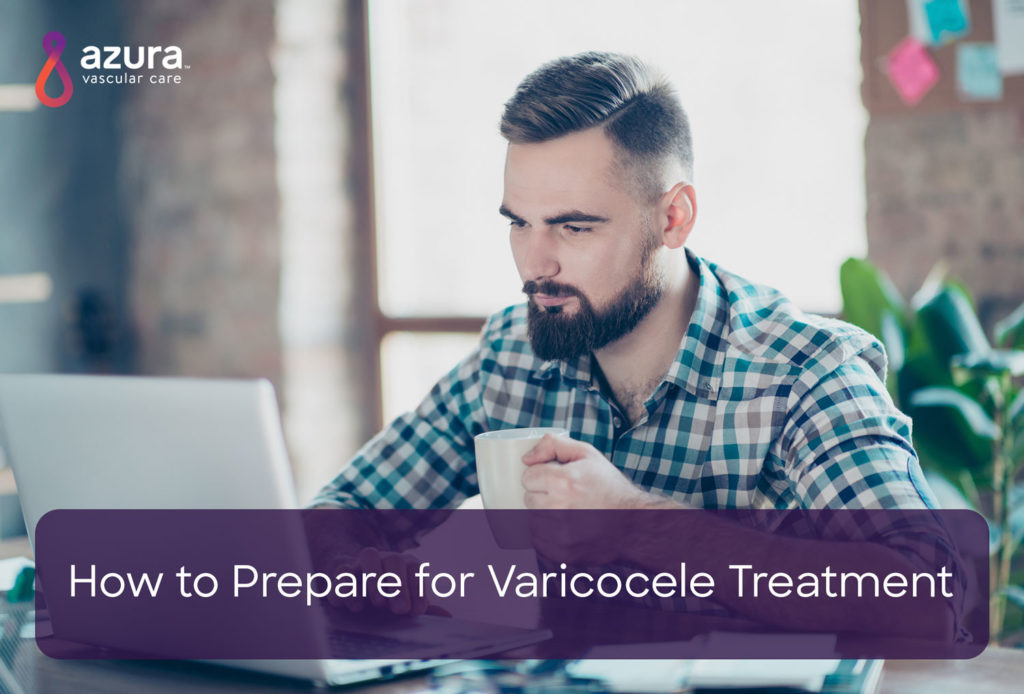
Men who have been diagnosed with a varicocele may experience symptoms such as pain or swelling of the scrotum, and in some cases, infertility. The good news is varicoceles are treatable so you don’t have to live with this condition forever. Seeking treatment can help improve your fertility, relieve your varicocele symptoms, and boost your self-confidence, allowing you to get back your normal life and feel great again.
The steps you must take to prepare for varicocele treatment may vary depending on whether you’re having surgery or minimally invasive, varicocele embolization. Knowing what to expect from varicocele treatment and how to prepare for your procedure can help to reduce complications and provide a better patient experience.
Here are seven steps you can take to help prepare for your varicocele treatment. To be fully prepared, be sure to ask your doctor for specific instructions so you can be ready on the day of your procedure.
7 Things You Can Do to Prepare for Varicocele Treatment
1. Inform Your Physician About Medications You Take
 Some medications and herbal supplements may increase the risk for bleeding, or produce adverse reactions when used with sedatives administered for general anesthesia. i Tell your doctor about any medications and herbal treatments you may be taking, including any over-the-counter medicines. Aspirin, blood thinners, and non-steroidal anti-inflammatory drugs may cause adverse reactions during varicocele treatment.
Some medications and herbal supplements may increase the risk for bleeding, or produce adverse reactions when used with sedatives administered for general anesthesia. i Tell your doctor about any medications and herbal treatments you may be taking, including any over-the-counter medicines. Aspirin, blood thinners, and non-steroidal anti-inflammatory drugs may cause adverse reactions during varicocele treatment.
2. Take Prescription Medications as Directed
After informing your doctor of medications you use, you may be given specific instructions regarding how to take your medication in the days leading up to your varicocele treatment. You may be instructed to stop taking certain medications, or to reduce your normal dosages until after treatment. Take prescription medications exactly as directed by your doctor to benefit from fewer complications and a safer recovery.
3. Shave the Treatment Area
Shaving the surgical site on your groin can help make it easier for your doctor to perform surgery or embolization. Ask your doctor whether you’re responsible for shaving your groin area yourself, or whether it will be done by a medical professional on the day of treatment. Also, be sure to remove any piercings and jewelry from your scrotum, if applicable.
4. Avoid Eating Within Hours of Varicocele Treatment
Avoid consuming any food or liquids eight to 12 hours before varicocele surgery, since doing so can increase your risk for vomiting and aspiration if you’re receiving general anesthesia. ii Ask your doctor for explicit instructions surrounding what you can eat and drink, and when you should stop eating before your procedure. If your treatment for varicocele involves embolization, your food and drink limitations may vary from those having a surgical treatment.
5. Bathe Before Your Procedure
Bathing before your procedure helps lower the risk for complications and infection. Use a mild soap or cleanser to wash your groin area on the morning of your procedure. Avoid applying any lotion, cologne, and deodorant to your groin, since these products may cause irritation and increase the risk for infection. iii
6. Arrange for Care and Transportation
Varicocele treatment can make you feel tired and groggy, especially if you receive general anesthesia for surgery. iv Make for childcare or pet care if necessary, and ask a friend or family member to drive you to and from your .
7. Ask for Aftercare Instructions
 For a surgical procedure, ask your doctor for detailed aftercare instructions so you can properly care for both yourself and the surgical site following your procedure. Failing to adhere to aftercare instructions can result in infection, scarring, and varicocele recurrence. v
For a surgical procedure, ask your doctor for detailed aftercare instructions so you can properly care for both yourself and the surgical site following your procedure. Failing to adhere to aftercare instructions can result in infection, scarring, and varicocele recurrence. v
For instance, ask about how to care for your incision, and how soon you can exercise or have sex after varicocele treatment. Recovering from varicocele surgery can take up to two or three weeks, and requires you to avoid strenuous activity of any kind and to take special care of your incision to prevent infection. vi
If you’re seeking a minimally invasive option for treating your varicocele, consider varicocele embolization, which offers less downtime, a faster recovery, and no incisions or scarring. Varicocele embolization can improve your fertility and relieve your symptoms without your having to worry about sedation, downtime, and hospitalization.
Ask your doctor about whether you’re a candidate for varicocele embolization. Azura Vascular Care offers varicocele embolization that can help provide you relief from your symptoms. Call 844-705-VEIN (8346) today to schedule an appointment with a vascular specialist.
Sources:
i https://www.ncbi.nlm.nih.gov/pmc/articles/PMC4777343/
ii https://www.hss.edu/anesthesiology-frequently-asked-questions.asp
iii https://www.stonybrookmedicine.edu/patientcare/PreSurgicalAdmissions/DayofSurgery
iv https://www.mayoclinic.org/diseases-conditions/varicocele/diagnosis-treatment/drc-20378772
v https://patienteducation.osumc.edu/documents/varicocelectomy.pdf
vi https://www.ncbi.nlm.nih.gov/pmc/articles/PMC3433543/



